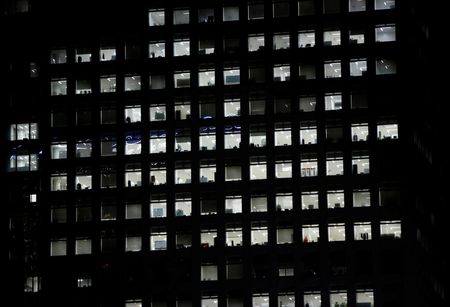By Tetsushi Kajimoto
TOKYO (Reuters) -Japanese companies delivered the biggest wage hikes in three decades this year, the nation’s largest union said on Wednesday, prompted by labor shortages and an inflationary squeeze on household income.
Monthly pay was up 5.10% on average this year, according to a survey of companies conducted since March by Rengo, the union with about 7 million members.
The outcome of the “shunto,” which means the spring labour offensive, is seen as key for Japan to achieve a positive cycle of economic recovery, driven by better household income and consumption that outweigh the rising cost of living.
While big firms, with 300 or more union-backed employees, raised wages by 5.19%, small firms increased the pay by 4.45%, it said.
The achievement of positive and self-sustaining growth could help policymakers put a decisive end to deflation and bring the Bank of Japan (BOJ) closer to further interest rate hikes as part of its efforts to normalise monetary policy.
In mid-March, major firms said pay raises had accelerated to 5.28% – the biggest since the country’s bubble burst in the 1990s. The BOJ then made its landmark decision to end negative interest rates and yield curve control policy.
With big firms’ pay rise becoming a done deal, the attention has now shifted to whether wage hikes may be spreading to small firms struggling to pass on costs to raise profit margins.
“In short, small firms have struggled to pass on costs to clients (who were at the lower end of supply chain). We need to exert more efforts to help boost their pricing competitiveness and realise 5% of wage hikes next year for small firms as well,” senior Rengo official Akira Nidaira told reporters.
“We also hope the government steps up efforts to help stabilise prices and currency so that more households can improve their living.”
While part-timers’ hourly pay is rising quickly, given corporate Japan’s need to lure young and able workers into coping with a chronic labour crunch, income gaps remain.
As part of efforts to address the gap, Prime Minister Fumio Kishida’s administration has vowed to raise minimum hourly pay to 1,500 yen ($9.27) from around 1,000 yen on average by the mid-2030s.
($1 = 161.8300 yen)
(Reporting by Tetsushi KajimotoEditing by Chang-Ran Kim and Anil D’Silva)









